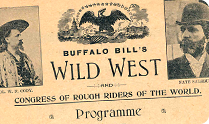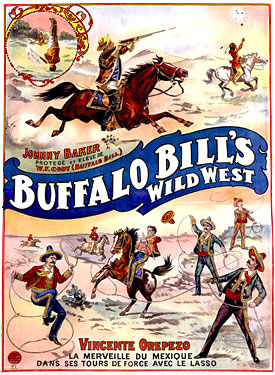Buffalo Bill, American Idol
An AMERICAN EXPERIENCE SeminarTuesday, Nov. 9, 2010
7:00 p.m.–8:30 p.m. (EST)

Leader
Professor of American Studies
University of North Carolina at Chapel Hill
National Humanities Center Fellow
About the Seminar
Between 1883 and 1916, Buffalo Bill’s Wild West — an extravaganza of riding, roping, shooting, Indian attacks, and stage coach robberies — gave audiences throughout the world an image of the American West so vivid that, for millions both here and abroad, it became the American West. In the process William F. Cody, Buffalo Bill, established himself as one of, if not the, most famous American of his era. How did he achieve his fame? Why were audiences so captivated by his shows? How did he define the West?
Built around the AMERICAN EXPERIENCE historical documentary film Buffalo Bill, this seminar will explore themes that illuminate American life in the late nineteenth and early twentieth centuries and that still resonate today, themes like the rise of mass entertainment, the creation of celebrity, the power of popular culture, and the role of the West in American national identity.

Enter Moodle Forum
Assigned Texts
To incorporate seminar texts into your teaching, we offer the National Humanities Center’s Primary Document Application Form.- Buffalo Bill, an AMERICAN EXPERIENCE program on PBS.
- “Introduction” from Joy Kasson, Buffalo Bill’s Wild West: Celebrity, Memory, and Popular History, (New York: Hill & Wang, 2000), pp. 3–8.
- Table of contents, Program from Buffalo Bill’s Wild West, 1893. (Note the presentation of the program and the nature of the different acts.)
- Two chapters from Cody’s autobiography, The Life and Adventures of Buffalo Bill, 1917 edition. (Cody’s highly-fictionalized account of his life makes entertaining reading.)
- An excerpt from Robert Rydell and Rob Kroes, Buffalo Bill in Bologna: The Americanization of the World, 1869–1922 (Chicago: University of Chicago Press, 2005). (European responses to the Wild West show.)
Supplemental Readings
(notes and texts)- Frederick Jackson Turner, “The Significance of the Frontier in American History,” address, 1893, excerpts
- Stephen Crane, “The Bride Comes to Yellow Sky,” short story, McClure’s Magazine, February 1898
- The Future of the Red Man
Online Evaluation
Seminar Recording
Download Recording (You will need to install the WebEx ARF player, available at download, to play back the recording.)
